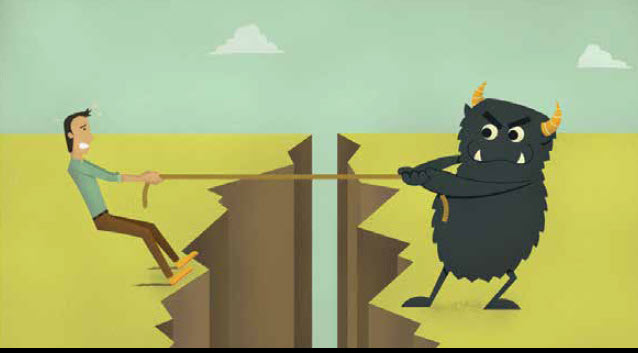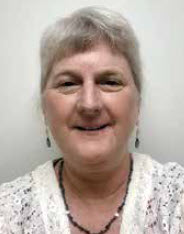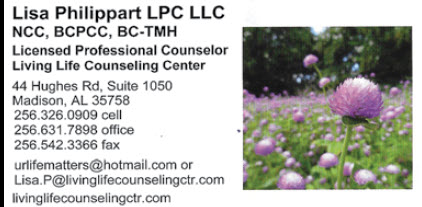Therapy metaphors use a story or illustration to see alternative ways of looking at something. Every culture and religion uses these types of stories, analogies, or parables to improve understanding, make a point more memorable, and hopefully help us to make positive changes. In my January articles, I will be sharing metaphors that help us to see thoughts (their nature and role) in a different light. Just this alone, seeing thoughts differently, allows us to create a space between us and our thoughts, which leads us to see things a bit more objectively. Once we are able to do this, we can make wiser and more helpful decisions about how to respond (not react) effectively.
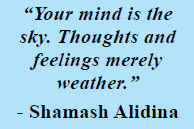 The Quicksand is used by Stephen Hayes to introduce his clients to Acceptance and Commitment Therapy (ACT.) When we are stuck in quicksand, the immediate impulse is to struggle and fight to get out. But this is exactly the opposite of what you should do — because as you put weight down on one part of your body, it goes deeper. The more you struggle, the deeper you sink. The only option for survival is to spread your weight over a large surface area, laying down. It goes against all our instincts to lay down and be with the quicksand. So, it is with distress. We struggle and fight against it, but we have perhaps never considered just letting it be. If we considered being with the distressing thoughts and feelings, we’d find we get through it and survive…much more effectively than if we’d fought and struggled.
The Quicksand is used by Stephen Hayes to introduce his clients to Acceptance and Commitment Therapy (ACT.) When we are stuck in quicksand, the immediate impulse is to struggle and fight to get out. But this is exactly the opposite of what you should do — because as you put weight down on one part of your body, it goes deeper. The more you struggle, the deeper you sink. The only option for survival is to spread your weight over a large surface area, laying down. It goes against all our instincts to lay down and be with the quicksand. So, it is with distress. We struggle and fight against it, but we have perhaps never considered just letting it be. If we considered being with the distressing thoughts and feelings, we’d find we get through it and survive…much more effectively than if we’d fought and struggled.
Passengers on the Bus. You are the bus driver. You can be driving while all the passengers (thoughts) are being critical, abusive, negative, distracting, and shouting directions. Some passengers (thoughts) may be kind, considerate, friendly, helpful, and encouraging. Either way, keep your attention focused on the road ahead, driving the bus towards your goal or purpose.
The Beach Ball. We try to stop thoughts, but that is really impossible. It’s like trying to constantly hold an enormous inflatable beach ball under the water. It keeps popping up in front of our faces. We can allow the ball to float around us, just letting it be. So rather than stop the thoughts, we can stop fighting them, and let them happen, without reacting to them.
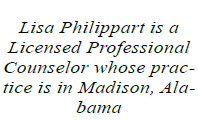 Tug of War with a Monster. Imagine you are in a tug of war with some huge anxiety (depression, etc.) monster. You have one end of the rope and the monster has the other end. In between you, there is a huge bottomless pit. You’re pulling backward as hard as you can, but the monster keeps pulling you ever closer to the pit. What’s the best thing to do in that situation? Pulling harder comes naturally, but the harder you pull, the harder the monster pulls. You’re stuck. Dropping the rope means the monster’s still there, but you are no longer tied up in a struggle with it. Now you can do something more useful.
Tug of War with a Monster. Imagine you are in a tug of war with some huge anxiety (depression, etc.) monster. You have one end of the rope and the monster has the other end. In between you, there is a huge bottomless pit. You’re pulling backward as hard as you can, but the monster keeps pulling you ever closer to the pit. What’s the best thing to do in that situation? Pulling harder comes naturally, but the harder you pull, the harder the monster pulls. You’re stuck. Dropping the rope means the monster’s still there, but you are no longer tied up in a struggle with it. Now you can do something more useful.
The Tunnel. When we get anxious driving through a tunnel, the best option is to keep going rather than stop or try to escape. This feeling will pass…there is an end to this tunnel.
The Mountain. Whatever the weather, or whatever happens on the surface of the mountain, the mountain stands firm, strong, grounded, permanent. We can be like that mountain—observing thoughts, feelings, sensations—knowing inner stillness and strength.
Thought Train. We can sit on the train, watching the scenery (our thoughts, feelings, and sensations) go by, or stand on the platform, watching the thought train pass through. We don’t have to jump on it.
The River. Sometimes it feels like we’re being carried away downstream, struggling to stay afloat among the mud, filth, and debris. The muck is negative thoughts and feelings, and the river is our distress as we drift helplessly downstream. But we can stand on the riverbank. You might watch individual items as they pass. For example, you might picture a negative thought floating on a tree branch or a troubling event as an old bicycle tire. You can stand and watch without being caught up in the flow.
Join me next time for more therapy metaphors.
By: Lisa Philippart – Licensed Professional Counselor


